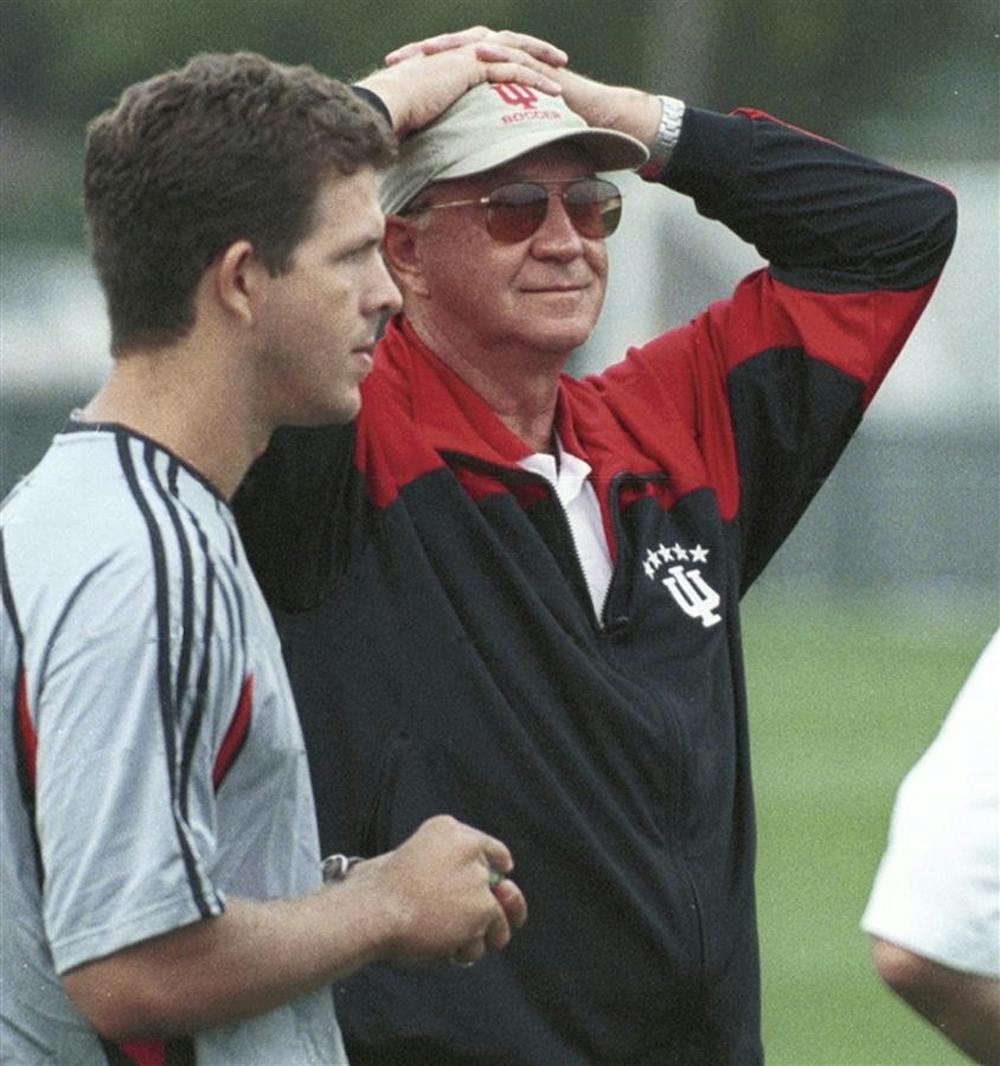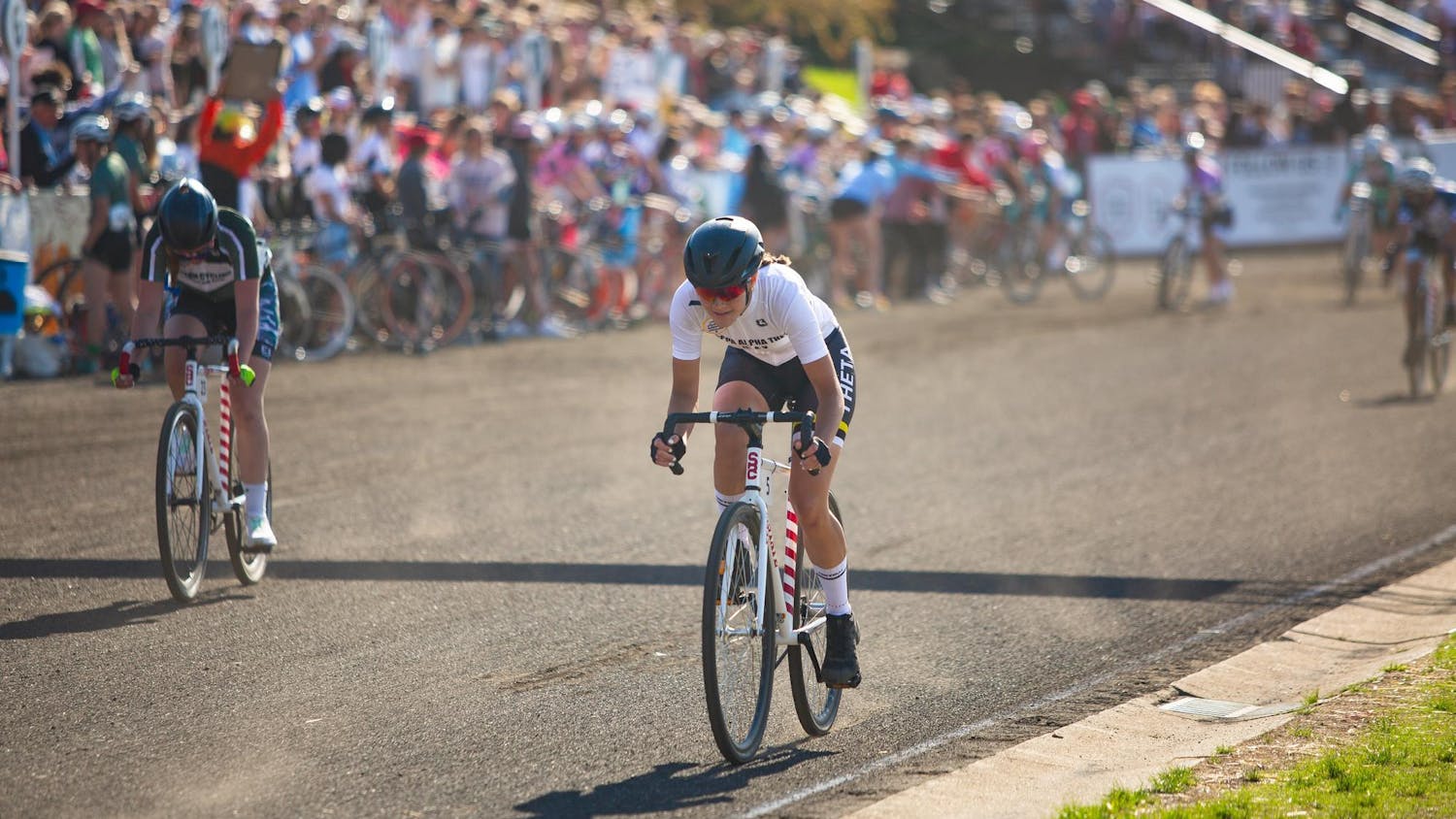When Jerry Yeagley planted the soccer seed at Indiana, he didn’t just grow the Hoosier program. His seed pollinated and spread to Akron, Ohio, and St. Louis, to Birmingham, Ala., and Winston-Salem, N.C., and even to another Big Ten school in Madison, Wis.
However, Yeagley’s seeds didn’t just spread soccer across the nation. They implanted their main root in the one thing IU soccer wins by: that the team is not just a team, it is a family.
Yeagley’s influence on the program for 31 years and 544 wins have led to 19 former players either at a head or assistant coaching position in college soccer programs. Former Hoosiers coaching across the nation even extend to the high school and youth levels.
Getman’s Growth
Mike Getman’s seed was planted in Hoosier soccer as a defender in 1977. After 33 years, Getman said he feels as close to the Indiana soccer family as he did the first time he put on that Indiana jersey.
“The strength of Indiana soccer is the fact that every player that has ever come through has felt like they are part of that family,” Getman said from his office at the University of Alabama-Birmingham. “When a young player is looking at different colleges to attend, he has to be impressed by the number of alums that come back to games and that stay in touch with the coaching staff and the true family atmosphere that surrounds the program.”
During his years playing and assistant coaching around Yeagley and Hoosier soccer, Getman learned that pride in the results on the field were just as important to the program as pride in the results off the field.
“It’s not just, ‘What did you do on the field today?’” Getman said. “It’s ‘How are you doing in the classroom?’ and ‘How are you doing socially?’”
Even after Getman left the program, the IU soccer family reached out to him, still asking about, first and foremost, his blood family and then his soccer family.
Since Getman arrived at UAB 19 years ago as head coach, the program has changed drastically, adding alumni weekends and phone calls to former players to give it that Indiana touch. It has also produced five trips to the NCAA tournament to a team that had only three winning seasons in its first 13 years.
Getman doesn’t speak with somebody from IU soccer every week, but they keep in touch often.
“We don’t have a designated day,” Getman said. “We end up in communication for so many reasons. Sometimes it’s professional. Sometimes it’s a call just to congratulate on another good win. Just as a family, you live apart, but you don’t lose touch with each other.”
But communication is one of the keys to the chest of success — at least, it was for Yeagley.
“A day doesn’t go by where I don’t talk to at least one of the past players,” Yeagley said. “Staying in touch, communicating and keeping interested and informed and reaching out to the extended family — the fans the parents, the students, the alums — are all part of it.”
Trask’s Trials
John Trask planted his seed in Bloomington in 1984, earning letterman status for four years. He was a full-time staff member for seven years (1993-1999), helping IU to a 136-20-6 record.
Trask became head coach of the Wisconsin Badgers in 2010. In his first year, Trask’s team stumbled to a 4-13-3 record, but he said he is taking what he learned from past experience about a tradition of excellence and pride in the jersey to apply it to his program.
“Slowly, but surely,” Trask said about the changes in Madison. “I think what coach would be proud of in all of us is we’ve taken all the good stuff he’s taught us, and we’ve not lost who we are. Yeah, there are some components of Indiana soccer, but there’s a lot of John Trask as well.”
That management of players and coaches is also something Trask wants to implement into his program. In his mind, he is going through the rolodex of Yeagley’s lessons one at a time to help his young team, but he said it’s going to take time.
“(Coach Yeagley) remains an unbelievable resource even today in my career,” Trask said. “When you work for a legend like that, I think you end up being better prepared. The moments when coaches make or break themselves is in adversity. Coach had just an unbelievable way of dealing with people. We’d all agree, throw out the X’s and O’s, and management is what it’s really all about.”
Management of players and a deeper understanding of the player is also a key to Yeagley’s chest of success.
“I was able to still establish the difference between coach and player, but I really, really enjoyed getting to know them as more than just soccer players and being part of their life and their being part of mine,” Yeagley said. “Those bonds, you hear about that in service where soldiers talk about that brotherhood — it’s a special thing that’s hard to explain in words, but it’s very, very strong and very meaningful. We have that.”
Porter’s Prestige
In 1994, the seed of Caleb Porter was dug into IU soccer. He was a three-year captain. In 1997, Porter was runner-up for the Hermann Trophy, awarded to the nation’s top collegiate player.
As Indiana’s recruiting coordinator, Porter attracted the talents of four national players of the year, 14 Youth National Team members, 18 All-Americans and 12 state players of the year.
Now, Porter leads an Akron team that has the No. 1 winning percentage in the last five years and has only lost two home games in the same amount of years.
This weekend, his team is making its second consecutive appearance in the College Cup.
“I learned how to build a program, and I learned what it’s about and what it takes to run it from top to bottom from IU soccer,” Porter said.
The experiences Porter had around IU are what, he said, makes him a strong coach today.
“We had an obligation, the current players, to uphold that tradition at Indiana,” Porter said. “Those are a lot of same things that I preach at my program. At Akron, you’re joining something special, something bigger than yourself, and you have a chance to do something that has never been done.”
While IU has hoisted the national championship trophy seven times in its program history, Akron is still in hopes of its first national title. Luckily for Porter, he was around IU soccer during a time when the team made regular College Cup appearances.
“While I was a player, we were competing for national champions,” Porter said. “While I was a coach, we were competing and winning national championships, and I lived in that environment for 11 years. My standards are based off of the standards that I’ve learned from being a part of the IU tradition of excellence.”
Before that tradition was born on the field, it was strengthened across campus. When soccer was a club, the players used to hang up sheets across campus to advertise their games.
“The family started, very honestly, when we were a club for 10 years from ’63 to ’73,” Yeagley said. “We had to do everything from lining our fields to my wife washing the uniforms. We had no money. That was the root.”
Once the club became a varsity sport, it didn’t matter to Yeagley that they had administrative support or finances — they still hung sheets to advertise games.
“I think it brought the team closer together, and it just helped in terms of establishing trust and respect among the players and coaches and giving everybody a bond, a family-type bond,” he said. “If you talk to anyone, or most people, about IU soccer at some time or another, the word family will come up.
“There’s great pride. Establishing pride in the uniform and establishing pride in the program, the alums are very, very proud to have been part of it, and that’s important.”
Yeagley’s Year
Todd Yeagley’s seed in IU soccer could have been planted in the early 1970s when he was in diapers around the program, or in 1991 when he competed in his first of four years as an All-American.
Regardless, in December 2009, his seed was once again sewn into Jerry Yeagley Field when the younger Yeagley took control of the program six years after his
father’s retirement.
In his first year, Todd led his 10-8-2 team to the third round of the NCAA Tournament and a Big Ten regular season championship.
Although Todd Yeagley’s head coaching experience is not the same his father’s, their branches grow in the same direction.
“Jerry Yeagley and Todd both are just really nice people, and they genuinely care about the people they’re working with,” Getman said. “Whether you’re a reporter or a player or an alum or just a booster of the program, they’re not just out to help the program. They generally care about how you’re doing.”
Many times, without realizing it, Todd’s first question to his players or coaches is, “So, how’s the family?”
“Friendships, relationships, are important to me. Period. Soccer aside,” Todd said. “To build a program from the ground up with core principles and values and the importance of what family truly is, is really some of the backbone of our program.”
In 1963, Jerry Yeagley planted a seed in Bloomington that grew into the standard. Now, his seeds are trying to meet and surpass those standards.
“The real rewards for a coach,” Jerry Yeagley said, “especially at the end of his career, are his products, are the people that worked with him and how they do as they
go out.”
Former men's soccer players benefit from Yeagley's legacy

Get stories like this in your inbox
Subscribe



